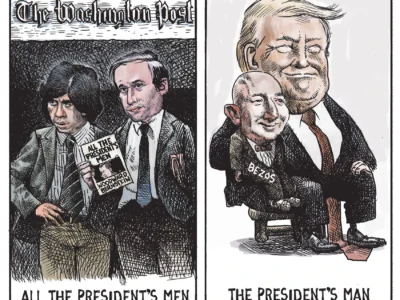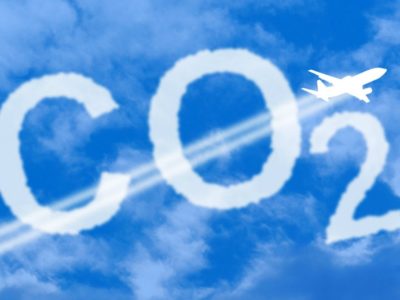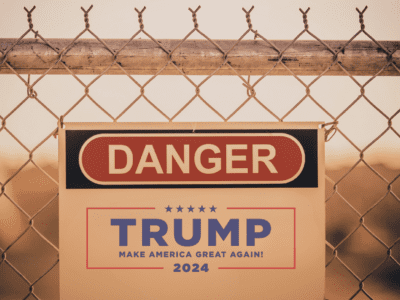Guest Blogger David Spence: Another Take on the Tillerson Nomination
Hearings on the nomination of ExxonMobil CEO Rex Tillerson to be President-elect Donald Trump’s Secretary of State are scheduled to begin on January 11th. The nomination puts Tillerson and his company at the vortex of a whirlwind of public grievances about ExxonMobil’s positions on climate science and Russian influence over American politics and policy. While those grievances are mostly legitimate, they cannot all be laid entirely at Tillerson’s feet. But politics being what it is, they could torpedo his nomination nevertheless.
Tillerson and Climate Denial
Some environmental groups and state attorneys general are pursuing ExxonMobil in court for its past duplicity in denying publicly that fossil fuel combustion drives climate change while the company’s own research supported that connection. The recent revelation of that duplicity has spurred litigation against ExxonMobil based upon a variety of legal theories, including tort actions of the kind brought against tobacco companies in the 1980s, as well as claims alleging fraud in the valuation of oil reserves under securities laws.
[Full disclosure: I have friends who work with some of the NGOs who have sued ExxonMobil over this issue, and I am a long-time financial supporter of the Environmental Defense Fund, which has publicly supported a federal investigation into ExxonMobil’s record on climate science and climate change. I also have friends who work for ExxonMobil, having participated as a University of Texas professor in multiple executive education programs serving ExxonMobil employees.]
The analogy between the cigarette cases and the ExxonMobil is imperfect. Both situations involved disclosure (long after the fact) of company awareness of a risk that it publicly denied. ExxonMobil did indeed fund NGOs like the Heartland Institute that sought to undermine public acceptance of climate science that its own ExxonMobil’s researchers viewed as credible. But the similarities end there. Tobacco companies manufacture a product sold to consumers who ingest the product directly, while oil companies sell a fuel the combustion of which hastens global warming, triggering global climate changes that in turn produce a wide variety of predicted harms such as sea level rise, severe weather, and more.
The causal connection between the potential defendants’ wrongdoing (misleading public statements about the underlying science), and the harm suffered by the potential plaintiffs, seems far more tenuous in the climate change cases than the tobacco cases. (Recent Supreme Court decisions have declined to recognize private tort claims against oil companies for damage due to climate change because the Clean Air Act displaces such claims.)
The weakness of climate-related tort claims may be why most of the cases brought recently by state attorneys general against ExxonMobil focus on the notion of a “carbon bubble” – the idea that climate science implies that the company’s oil reserves are overvalued (in violation of SEC reporting requirements) because most can never be exploited without causing significant harm, something the company must have known based on its understanding of climate science. Activist Bill McKibben has been sounding this call for several years, and it has steadily gained political currency over time.
But ExxonMobil’s earlier-than-acknowledged understanding of climate science is not the sort of smoking gun likely to dramatically strengthen these claims.
Like all oil companies, ExxonMobil will leave its resources in the ground until it is profitable to extract them. Some may never be produced. Whether and to what extent ExxonMobil will exploit its oil and gas reserves in the future (and, therefore, the value of those reserves now) depends upon forces affecting the future supply and demand for oil that are difficult (some might say impossible) to predict, including changes over time in the cost of producing that oil, the availability of substitutes, currency exchange rates, broader technological change in the energy sector, and laws and regulations.
Indeed, those reserves may yet be produced even in a future where greenhouse gas emissions are prohibited. Just recently ExxonMobil announced a technological breakthrough that dramatically reduces the costs of capturing GHG emissions associated with fossil fueled power production. That breakthrough, and others like it, may drastically reduce the costs of operating zero-emission fossil-fueled power plants or vehicles. Can we say with any certainty that there will be little or no market demand for those sorts of power plants or vehicles in the future? Probably not.
Given the difficulty of predicting technological change, future market conditions, and future regulation, it may be difficult to convince a court that companies like ExxonMobil are overvaluing their hydrocarbon reserves.
In some ways, it would be ironic if understandable animosity toward ExxonMobil’s past climate science duplicity animates opposition to the Tillerson’s nomination. It was Tillerson’s predecessor who oversaw most of the company’s climate denial activism. Tillerson moved ExxonMobil away from its funding of the Heartland Institute and publicly accepted the notion that climate change is real. Though some claim the shift was “P.R.,” others (including the New York Times’ Clifford Krause and UC Berkeley’s Dan Farber) see the shift as significant. So do I.
As Secretary of State, Tillerson’s remit would be less directly involved in climate policy than those of fellow nominees Scott Pruitt (EPA) and Rick Perry (Secretary of Energy), each of whom has more consistently denied the validity of established climate science. On the other hand, any long-term solution to the threat of climate change will involve diplomacy, and so will implicate the State Department.
ExxonMobil under Tillerson supported the recent Paris Agreement on climate change, calling it “an important step forward” on the issue. But president-elect Trump has criticized the agreement, as have many of his advisors and other cabinet nominees. Will Tillerson toe that line? Who knows?
Tillerson as Diplomat
Others worry about Tillerson’s lack of government diplomatic experience and his “friendship” with Vladimir Putin, particularly given the backdrop of President-elect Trump’s apparent naïveté about Putin and acceptance of Russian meddling in the 2016 presidential election.
President-elect Trump’s fondness for Putin and Russia is indeed worrying because of Russia’s direct meddling in the election and Trump’s undisclosed business ties to Russia, and Trump’s apparent willingness to trust the Kremlin more than he trusts American intelligence agencies. Viewed in this context, Tillerson’s ties to the Kremlin look like a piece of a disturbing puzzle.
Like the other oil supermajors, ExxonMobil sought access to Russian oil riches after the breakup of the Soviet Union. ExxonMobil was more successful than many of its peers, in part by negotiating partnerships with those Russian oil companies that were most acceptable to the Kremlin. The sanctions imposed on Russia after its invasion of Crimea brought to a halt several ExxonMobil projects in Russia, projects that are likely to produce revenue for the company if sanctions are lifted.
Tillerson’s critics charge that he will view diplomacy with Russia through a narrow, ExxonMobil lens. Others worry more generally about the fact that both the president-elect and his Secretary of State nominee lack experience or grounding in government diplomacy.
In a strange way, Tillerson’s appointment (and Trump’s election) undermine Putin’s Machiavellian use of the United States-as-bogeyman to build domestic political support. And Tillerson is what Donald Trump claims to be — a capable negotiator who can make deals on behalf of his organization. That is a transferable skill, but only partly. Multi-stakeholder diplomacy is a more complicated, politically subtler business, when the stakeholders are nations, requiring an even higher level of intellectual openness and humility than that required of a CEO. Tillerson may possess those qualities in the right doses, but negotiating deals on behalf of ExxonMobil is not necessarily proof that he does.
Nevertheless, as someone who believes in climate science and supports the Obama Administration’s efforts to fight global warming, I am much more concerned about the Pruitt and Perry nominations than the Tillerson nomination, since each will hold the power directly to undo important climate policies the moment he takes office.
Still, Rex Tillerson is the face of the biggest investor-owned oil company in the world. That alone makes him a natural focal point for public frustration about past and future American timidity in regulating greenhouse gas emissions, particularly after the recent disclosure that ExxonMobil’s own researchers supported the very science the company was trying to undermine. For those reasons, his nomination may be at more political risk than others whose views seem much less scientifically and politically defensible.
David Spence is Professor of Law, Politics & Regulation at the University of Texas at Austin, where he teaches in both the McCombs School of Business and the School of Law.
Reader Comments
3 Replies to “Guest Blogger David Spence: Another Take on the Tillerson Nomination”
Comments are closed.







David,
I appreciate your perspective. The issue I have with the Tillerson nomination is corruption.
Tillerson is probably as qualified as anyone to be Sec. of State and is a patriot, whatever his views on climate change.
But Exxon Mobil, by rewriting Tillerson’s employment contract in order to undue conflicts of interest has essentially given him an enormous bribe – in the terms of US ethics law, an “extraordinary payment.” This is a problem both for Tillerson’s role at State as well as for the long term incentives of executives at Exxon, one of the largest private institutions in the United States.
The Board took this action despite the fact that in its disclosures to shareholders and its filings with the SEC, it state’s clearly that, without exception, the only reason that restricted stock granted to executives can vest early is the death of the executive. So there is a corporate governance issue here as well as an “extraordinary payment” issue. Public and private corruption.
Both are concerns in an environment where corruption of US institutions under the Trump Admin is a growing issue.
Warm regards,
Michael
David Spence said;
“…..As Secretary of State, Tillerson’s remit would be less directly involved in climate policy than those of fellow nominees Scott Pruitt (EPA) and Rick Perry (Secretary of Energy), each of whom has more consistently denied the validity of established climate science…..”
Dear Professor Sence;
Good point! We do not expect Mr. Tillerson to stop the Clean Power Plan, this task will be performed by Pruitt and Perry with help from influential members of Congress.
Some of those worried members of the “public” who are frustrated about American timidity in regulating greenhouse emissions, may be dealing with anxiety over meager employment opportunities for climate practitioners.
coal miners & climate practitioners = environmental justice
Polar Bear Zoologist Blasts Obama’s Climate Alarmism: ‘Sensationalized nonsense’
“…..The International Union for Conservation of Nature pegs the polar bear population at between 22,000 and 31,000, which she called “the highest estimate in 50 years.” Studies have shown increases in some of the 19 Arctic polar-bear populations. In 2013, the FWS reported the Chukchi Sea population in Alaska was doing “quite well,” while the Norwegian Polar Institute found in 2015 that the Barents Sea polar bears had risen by 42 percent since 2004…..”
http://www.washingtontimes.com/news/2017/jan/9/polar-bear-conservation-group-blasts-obama-admin/